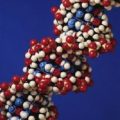
Individuals with a certain genetic variant are more likely to have a history of uncommitted sex, including one-night stands and acts of infidelity, according to Binghamton University researchers. The new study takes a broad look at sexual behavior, matching choices with genes, and has come up with a new twist on human sexual drivers.
The culprit, says study leader Justin Garcia, seems to be the dopamine receptor D4 polymorphism (DRD4) gene. Already linked to sensation-seeking behavior such as alcohol use and gambling, DRD4 is known to influence the brain’s chemistry and an individual’s behavior.
“We already know that while many people experience sexual activity, the circumstances, meaning and behavior is different for each person,” said Garcia. “Some will experience sex with committed romantic partners, others in uncommitted one-night stands. Many will experience multiple types of sexual relationships, some even occurring at the same time, while others will exchange sex for resources or money. What we didn’t know was how we are motivated to engage in one form and not another, particularly when it comes to promiscuity and infidelity.”
“What we found was that individuals with a certain variant of the DRD4 gene were more likely to have a history of uncommitted sex, including one-night stands and acts of infidelity,” said Garcia. “The motivation seems to stem from a system of pleasure and reward, which is where the release of dopamine comes in. In cases of uncommitted sex, the risks are high, the rewards substantial and the motivation variable – all elements that ensure a dopamine rush.”
The study provides support for the notion that the biological foundations for sexual desire may often operate independently from, although absolutely linked to, deep feelings of romantic attachment. That is, someone could be wildly in love with their partner, commit infidelity, and yet still be deeply attached and care for their partner. Garcia explains that individual differences in the internal drive for a dopamine rush can function independently from the drive for commitment.
But the study doesn’t let transgressors off the hook, adds Garcia. “These relationships are associative, which means that not everyone with this genotype will have one-night stands or commit infidelity. Indeed, many people without this genotype still have one-night stands and commit infidelity. The study merely suggests that a much higher proportion of those with this genetic type are likely to engage in these behaviors.”
Related:
Bad driving may be genetic
Chromosome study challenges infidelity dogma
Scientists uncover Homer Simpson gene
Ovulating women buy sexier clothes
Romantic rejection triggers reward and addiction centers in the brain








Comments are closed.